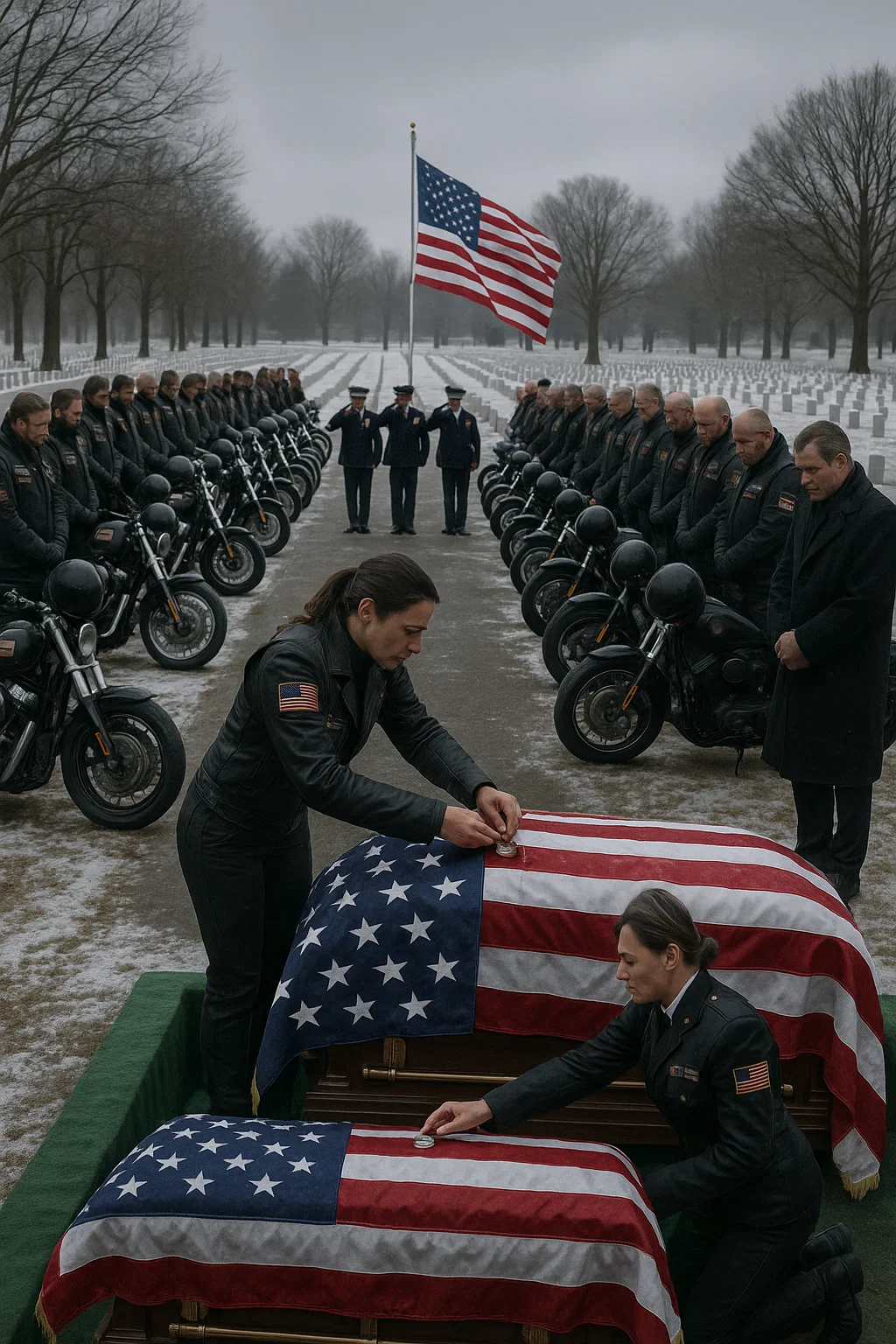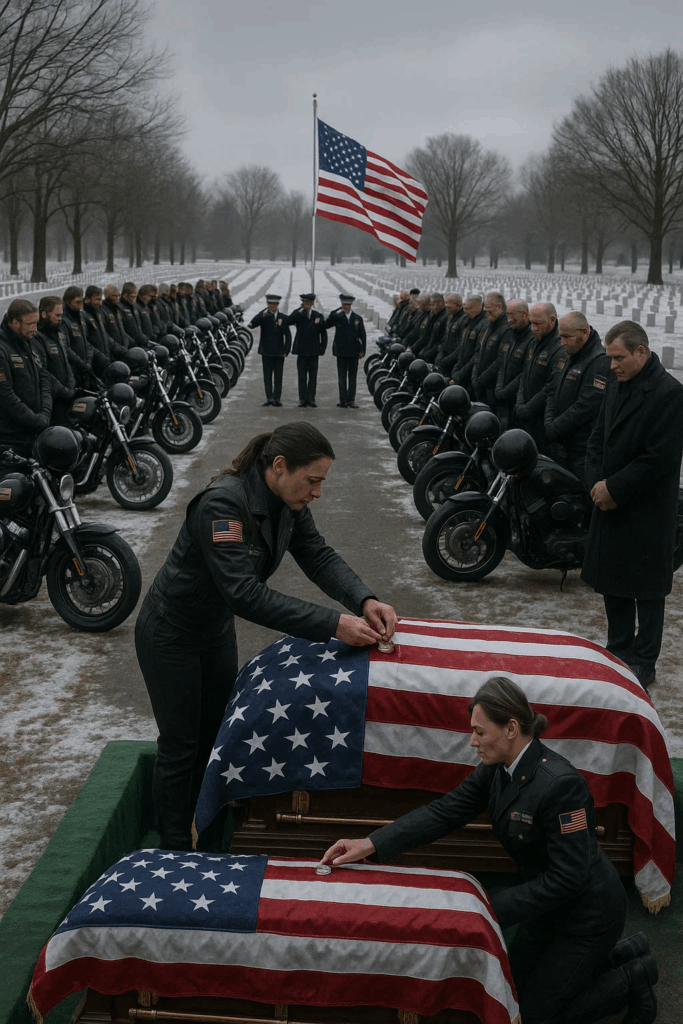“No one came to claim the body.”
Those were the words that haunted Tom Harris, the funeral director in Dayton, Ohio, as he stared at the manila file on his desk. Inside it was everything known about James “Jim” Ralston, a 68-year-old Vietnam veteran who had died quietly in a homeless shelter. No family had come forward. No friends. No one.
Tom had made the usual calls to next of kin—two adult children listed on the paperwork. Both refused to take responsibility for their father’s remains. “We haven’t talked to him in years,” the son said before hanging up. The daughter never even answered.
By law, Tom could authorize a simple, state-funded cremation. It was supposed to be quick, efficient, and quiet—just another forgotten soul. But something about Jim’s file made him pause. The worn Army photo tucked inside showed a young man standing tall in uniform, pride in his eyes. Tom couldn’t shake the feeling that a man who once served his country deserved more than an empty goodbye.
That night, after closing the funeral home, Tom wrote a short post on Facebook:
“We’ll be laying to rest a Vietnam veteran this week with no family to attend. His name was James Ralston. If anyone would like to come and pay respects, the service will be held Friday morning. No one should be buried alone.”
He didn’t expect much. Maybe one or two neighbors, maybe a few retired soldiers from the local VFW. But by the next morning, his phone began to buzz non-stop.
Messages poured in from all over Ohio. Veteran groups, motorcycle clubs, and strangers wanting to know the time and place. Among them was Mike Donnelly, leader of the Patriot Riders of America. When he saw the post, he sent one message to his crew:
“A soldier’s going home alone. Let’s change that.”…
Two days later, the small funeral Tom had planned began to grow into something no one expected. The sound of engines echoed across Dayton as dozens of bikers rode in, flags waving behind them. Locals peeked from their windows, wondering who had died.
At the cemetery gates, fifty-three riders lined up beside the hearse. Engines off. Helmets pressed against their hearts.
And as the casket draped in the American flag was carried out, Tom realized—
Jim Ralston wouldn’t be buried alone after all.
The December wind bit at their faces as the bikers stood silently around the open grave. Frost glistened on the grass, and the sound of boots crunching echoed through the still morning.
Tom watched from a distance, tears threatening his composure. He had never seen anything like it—so many people showing up for a man none of them had ever met.
When the bugler raised the trumpet and began playing Taps, the air seemed to freeze. Even the birds stopped singing. Every biker stood motionless, the mournful notes carrying through the cemetery like a final salute to a forgotten hero.

Among the crowd stood Lisa Grant, a retired Marine. She had ridden nearly three hours from Columbus. When the final note faded, she stepped forward and placed a small metal dog tag on top of the coffin. “He’s one of us,” she whispered.
After the burial, the riders lingered, wanting to know who this man had been. Tom shared what little he knew: that Jim had served in the Army from 1974 to 1978, stationed in Germany; that he returned home and worked in construction for a while; that life later became unkind.
Through public records, they learned he’d suffered from PTSD, lost his job, his marriage, and eventually, his home. Alcohol had numbed the pain until it consumed him completely.
“He wasn’t perfect,” Tom said softly, “but he wore the uniform. And that means something.”
The bikers nodded. In their world, service was sacred. One of them muttered, “He fought for freedom—then freedom forgot him.”
Before they left, Mike Donnelly called everyone to attention. “We came here as strangers,” he said, “but after today, Jim’s got fifty-three brothers and sisters.”
The sound of engines roared once more, but this time, it wasn’t noise—it was a salute. The ground trembled as the bikers revved their motorcycles in unison, one last farewell before riding off.
Tom stood alone after they left, staring at the fresh mound of earth. He felt a strange sense of peace. Jim might have died with nothing—but he had been buried with honor.
A week after the funeral, photos of the procession began circulating online—rows of motorcycles surrounding a hearse, flags fluttering in the cold air. The story of the 53 bikers spread across the country, touching thousands of hearts.
Messages flooded the funeral home. People sent flowers, letters, and donations addressed to “Jim Ralston, American Hero.” Some wrote about their own fathers who had served and been forgotten. Others simply said, “Thank you for remembering him.”
Tom used the donations to commission a small bronze plaque for Jim’s grave. It read:
James Ralston – U.S. Army – 1956–2024 – Never Forgotten.
Every few weeks, someone would stop by to clean the gravestone or replace the flag. Lisa came often, sometimes sitting in silence, sometimes talking to Jim as if he were an old friend. Mike Donnelly and his club organized a new tradition—“The Ride of Honor.” Every December, the bikers gathered at Jim’s grave, laid a wreath, and revved their engines one last time before winter.
News outlets began calling it “the funeral that changed a town.” Inspired by it, several veteran groups launched the “No One Buried Alone” initiative, ensuring every unclaimed veteran received a proper military farewell.
For Tom, the experience left a permanent mark. “I’ve seen too many lonely funerals,” he said in an interview. “But that day… that was America showing its heart.”
One afternoon months later, a man in his forties quietly visited Jim’s grave. He stood there for a long time, tears in his eyes. When Tom approached, the man admitted he was Jim’s estranged son. “I didn’t think anyone cared,” he whispered. “But seeing this… I was wrong.”
He placed a single white rose beside the plaque before walking away.
As the sun set over the cemetery, the bronze letters gleamed in the fading light. The veteran who once had no family now had hundreds.
Because sometimes, family isn’t the people who share your blood—
it’s the ones who show up when you’re gone.

